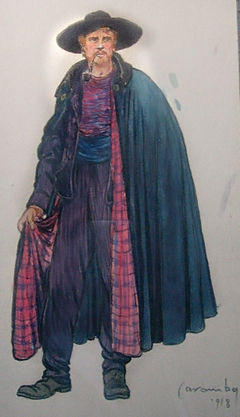Il Tabarro (The Cloak)

by Giacomo Puccini
“For though we toil, there’s little we can hope for, knowing our few joys will soon give way to sorrows.”
In true verismo fashion, this opera depicts people near the bottom of the social hierarchy, those who must work hard just to survive, and even harder to wrest a little joy from their arduous lives. Here are touching portrayals of real men and women: their hopes, dreams, and bitter disappointments.
Be touched by this remarkable work more deeply than ever before in my powerful new English version.
Excerpt:
Michel: “Nulla! Silenzio!“
"Nothing, but silence! She’s there, but still awake, and still she’s dressed. She's waiting. Who? Who is she waiting for? Who? Who? Maybe she’s waiting for me to fall asleep. Some man has changed her. I feel his cursed presence. He is standing here between us. And she’s his lover! Is it Taupe? He’s too old! Or maybe Goujon? No, no, he’d rather drink. Who could it be? Louis? No, he told me just today that he wanted to leave, and asked to be put ashore at Rouen. Then who is it? Who is it? Who could it be? To reach through the darkness and take hold of you by the neck, and scream in your face, “It’s you! It’s you!” Yes, scream in your face, “It’s you!” Oh, to see the fear in your eyes! Yes, you who robbed me of everything! “It’s you! It’s you! Die! Die! Die!” I’ll chain your fate to mine now and forever. And we’ll be dragged down under the water. Into the deep abyss we’ll go together. And you will come to know how much I’ve suffered. I’ll chain your fate to mine, now and forever. We’ll meet again in Hell!"
Copyright Kenneth Jakobs 2021
All rights reserved
Notes
Though the least performed of Puccini’s 1918 triptych of one-act operas, Il Tabarro, is a taught drama with many moving moments and some of his most harmonically advanced and interesting music.
It is based on a popular French play (La Houppelande) by Didier Gold, which Puccini saw in Paris in 1912. The libretto by Guiseppe Adami (La Rondine, Turandot) eliminated some of the plays characters and subplots while humanizing those that he retained. Primarily the story of an unfaithful wife and the two men who love her, we learn of the tragic event that destroyed the marriage, and experience both the grief and vengefulness of the cuckolded husband, who, as is often the case in such dramas, believes that only blood can avenge his dishonor.
And, as exemplified in the first quote, there are moving expressions of the plight of those who must toil for a living, and how that life breaks both their backs and their spirits.
